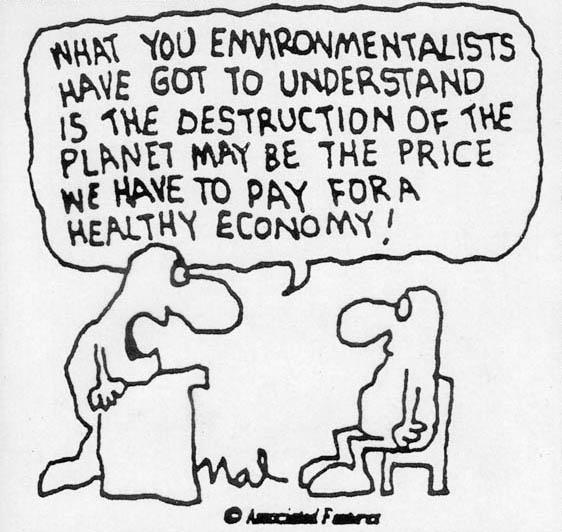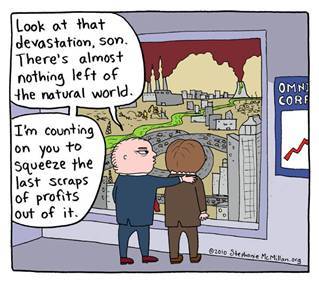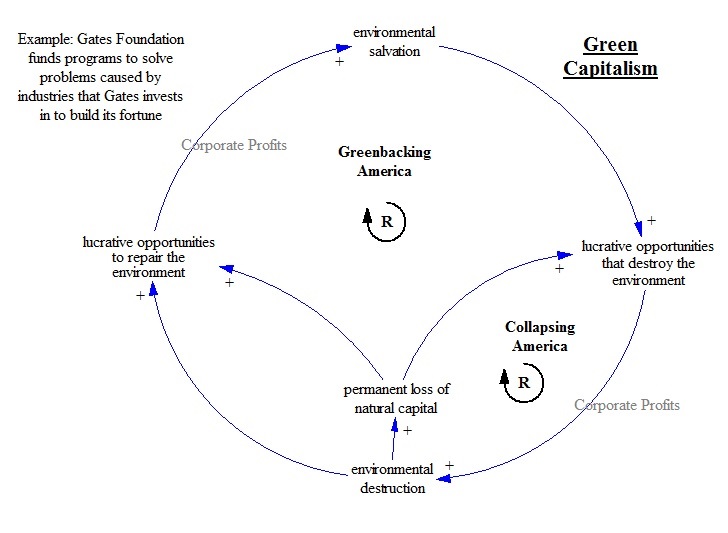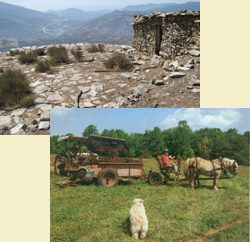« Folk Tales, Foreign Policy, and the Value of Systems Thinking | Home | The Alchemy of Language in the Pacification of the American People »
Locked In: The Paradox of Capitalism
By Karl North | July 2, 2014
Much of this post was lifted from an article by another author, because I found the logic and the language so compelling. But I neglected to keep the reference. If I learn who the author is, I will be happy to credit him/her with those statements that are not mine, and provide a link to the original article.
A sustainable economy is inconceivable without sweeping systemic economic change. Why? A sustainable economy requires a healthy planet, not the planetary destruction that is occurring now. But maximizing profit and saving the planet are inherently in conflict. Why?
Saving the world requires that the pursuit of profits be systematically subordinated to ecological concerns: For example, the science tells us that to save the planet for human existence, we have to drastically suppress fossil fuel consumption, even close down industries like coal. But no corporate board can sacrifice earnings, let alone put themselves out of business, just to save humanity, and no government can suppress fossil fuel industries because to do so would precipitate economic collapse.
That’s because under capitalism, CEOs and corporate boards are not responsible to society; they’re responsible to private shareholders, by law.
Won’t ‘efficiency’ improvements save us by conserving energy and materials? Not a chance. The waste-based industrial economy depletes the natural capital (raw materials) it requires. Under unrestrained capitalism, improving efficiency has always allowed and eventually led to more consumption, which rises to eliminate the savings in energy and raw materials that was gained. Adjusting our waste-based economy to operate at greater efficiency depletes natural capital more thoroughly at a higher rate. This classic behavior is called the Jevons Paradox.
What about ‘green capitalism’? Because under capitalism change relies on private investment, the practical effects of “greening” production are severely limited to tinkering with existing technologies that are really design failures, unable to survive in a post-petroleum economy. And most ‘green’ technology fails a life cycle analysis for energy and other resource consumption. Life cycle analysis reveals this easily.
In fact, green production under capitalism makes the situation worse. Example: Aquaculture was supposed to conserve wild fish populations. But this turns out to be just another case of “green gone wrong,” because, aside from contaminating farmed fish (and fish eaters) with antibiotics to suppress disease in fish pens, farm-raised fish are most profitable as carnivores. So they generally don’t eat corn. Feeding ever-more farmed fish requires capturing ever-more wild forage fish to grind up for fishmeal for the farm-raised fish, which leaves ever-fewer fish in the ocean, starving those up the food chain like sharks, seals, dolphins and whales. Calling fish caught for fish farms ‘trash fish’ just shows how unecological the conventional thinking is. So instead of saving wild fish, fish farming has actually accelerated the plunder of the last remaining stocks of wild fish in the oceans. And the fish farms spread exotic diseases in the ocean ecosystem, which are killing off the wild ones even faster.
Such examples are not exceptions: throughout the industrial food system forces intrinsic to the capitalist economy drive production beyond what nature’s laws can withstand, sending bad ripples in all directions. When the organic movement got steamrollered by the rise of industrial organic, it was in the cards, and those of us who understood the nature of our economy knew it before it happened. Worse, certified organic food from even the most careful organic farmers cannot avoid the contamination by pesticides and GMOs, and indirect damage from the loss of pollinators and seedstock that has sustainable genetics. This is not accidental: GMO technology is not about progress, it’s about corporate power and control. As farmers all over the world suckered into GMOs are beginning to learn, GMOs don’t increase farmer profits, they enslave farmers to agribusiness multinationals while creating hitherto unknown frankenfoods and monster agricultural pests.
The story is the same with pollution: Most of the pollution any car will ever produce (even the ‘greenest’ car), 56 percent, is generated in the manufacturing process before the car even arrives at the showroom – in the production of all the steel, aluminum, copper and other metals, glass, rubber, plastic, paint and other resources that go into every automobile, and in the manufacturing process itself. Again, life cycle analysis of any product reveals all this easily. Car producers don’t want to do the science because it doesn’t sell cars. Like most conventional technologies, most ‘green’ technologies fail a life cycle analysis for pollution, and also for depletion of increasingly scarce, finite raw materials.
Therefore the only way to prevent overshoot and collapse is to enforce a massive economic contraction in the industrialized economies, one that retrenches production across a broad range of unnecessary, resource-hogging, wasteful and polluting industries, eventually shutting down the worst. In effect it requires a controlled collapse and planned transformation. Yet this option is foreclosed under capitalism because this is not socialism: No one is promising new jobs to unemployed coal miners, oil drillers, automakers, airline pilots, chemists, plastic junk makers and others whose jobs would be lost because their industries would have to be closed out. We don’t do that under capitalism; we hang laid off workers out to dry. Hence a policy of sweeping economic contraction would create massive unemployment.
So everybody – CEOs, workers and governments – find that they all “need” to maximize growth, overconsumption, even pollution, destroying their children’s tomorrows to hang onto their jobs today. If they don’t, the system falls into crisis, or worse. We’re all imprisoned on board a runaway train of ravenous and ever-growing plunder and pollution. The present system locks us into a slow moving disaster.
So for example, when climate scientists such as Hansen tell us we need to “shut down the coal industry” and “leave most of the fossil fuels in the ground” to reduce greenhouse gas emissions, it’s only natural that, like auto workers, who will bite the bullet, none of us really want to think about the full implications of this imperative. So the tendency often is to think about this issue in isolation from the rest of the economy, as if fossil fuels are mainly in the “energy sector,” which we could fix by switching to renewables, by junking the clunker for a Prius, and go on driving and consuming as before while, hopefully, the economy also keeps on growing. But this is a delusion because in our economy, fossil fuels are in virtually everything we depend upon, and are necessary to drive every step of a product’s life cycle, from raw material to landfill.
Thus the industrial economy as a whole requires massive amounts of fossil fuels for maintenance purposes alone, just to keep the industrial plant going, to keep entropy at bay. The system (industrial plant and the economy it supports) was designed for, and can only survive on, cheap energy, and that is fast disappearing. An industrial economy operating on a finite planet eventually can no longer afford itself; that is where we are now, entering an era of permanently rising scarcity and ecological costs beginning to take effect. The evidence is all around us.
Topics: Political and Economic Organization, Social Futures, Peak Oil, Relocalization, Uncategorized | No Comments »



